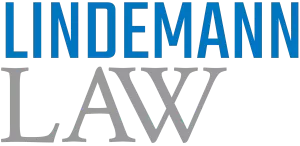- within Media, Telecoms, IT and Entertainment topic(s)
- in United States
- with readers working within the Media & Information industries
- within Media, Telecoms, IT and Entertainment topic(s)
- with readers working within the Metals & Mining industries
- within Media, Telecoms, IT and Entertainment topic(s)
Discover Switzerland's dynamic shift in gambling regulations up to 2025. From the historic ban in 1874 to the innovative Gambling Houses Act in 2000, the landscape has transformed drastically. Delve into how 21 casinos navigate the intricacies of A and B licenses and the leap into online gambling. A pivotal 2022 decision reshapes the industry's future from 2025. Uncover how these changes balance market potential with rigorous social and economic standards in Swiss gambling.
How did Switzerland transform its gambling policies from 1874 to 2024?
In 1874, the ban on gambling houses was enshrined in the Constitution. Only entertainment gambling was permitted in the "Kursaals", with a limit of CHF 2 and, from 1958, CHF 5.
In March 1993, the Swiss people voted by a very large majority to lift the ban on gambling houses. Financial considerations were decisive in the decision to lift the ban (debt brake on federal finances in 1992).
These new principles were enshrined in article 106 of the Constitution, which came into force in 2000 at the same time as the Gambling Houses Act (Spielbankengesetz SBG; Loi sur les maisons de jeu LMJ; RS 935.52; entered into force on 1 April 2000). A provision was included in the Federal Constitution stipulating that a portion of casino winnings should go towards old-age, survivors' and disability insurance (OASI; AHV; AVS). Since they began operating in 2002-2003, casinos have paid gambling house tax totalling CHF 7.309 billion, of which CHF 6.253 billion has been used to fund the OASI, and CHF 1.056 billion has been paid back to the cantons in which the casinos with Type B licences are located. These tax and regional benefits must be set against the costs generated by the negative side-effects of the operation of gaming houses (in particular gambling addiction).
The Gambling Act (Geldspielgesetz BGS; Loi fédérale sur les jeux d'argent LJAr; RS 935.51) was accepted by the Swiss people on 10 June 2018. It and its implementing ordinances came into force on 1 January 2019.
In Switzerland, anyone wishing to operate casino games must hold a licence allowing them to offer casino games to their customers. The Federal Council sets the number of licences and awards them for a period of 20 years. The current licences will expire on 31 December 2024.
There are currently 21 land-based casinos in Switzerland, spread across the country's various regions. Eight of them hold a type A licence, while 13 others hold a type B licence. There are two main differences between A and B casinos: a B casino can only accept bets of up to 25 francs on slot machines, whereas there are no such restrictions in an A casino. In addition, the cantons in which B casinos are located can levy a cantonal tax on gross gaming revenue (excluding online gambling), which is not the case for the cantons in which A casinos are located.
Under the Gambling Act, the 21 Swiss gambling houses now have
the option of operating online casino games. To do so, the Federal
Council must grant them a licence extension. Once they have
received this licence extension, the casinos still have to obtain
the necessary gaming permits from the Swiss Federal Gaming Board
(SFGB; ESBK; CFMJ) before they can start operating online.
Currently,
10 of the 21 land-based casinos offer online services.
Image 1: Today Land-based gambling houses
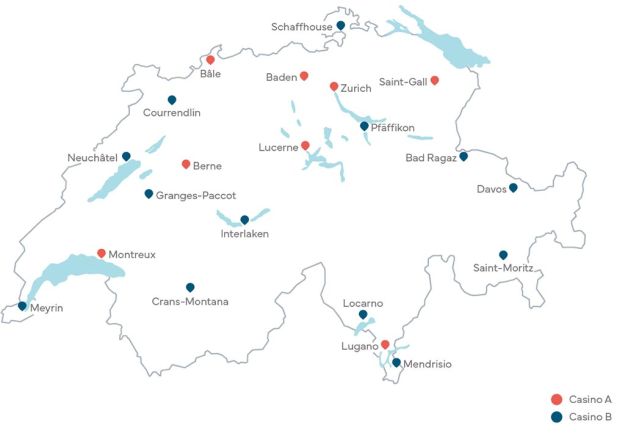
Source: Swiss Confederation, Swiss Federal Gaming Board
(SFGB)
Image 2 : Today Online gambling houses
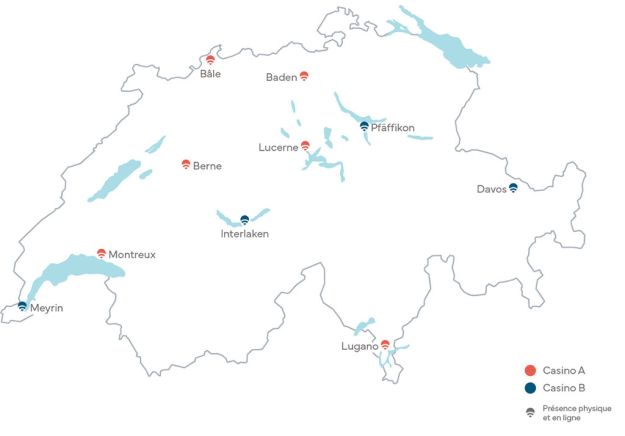
Source: Swiss Confederation, Swiss Federal Gaming Board
(SFGB)
What are the latest Swiss Federal Council's guidelines for casino licenses from 2025?
On 27 April 2022, the Federal Council took decisions in principle concerning the award of new licences valid from 1 January 2025. It approved the division of Switzerland into 23 zones, corresponding to a maximum of 23 licences (ten type A and thirteen type B). The Federal Council defined that an A licence could only be granted if the location chosen by an applicant enabled it to generate gross gaming revenue (GGR) of more than CHF 30 million per year from its land-based gaming offering, which is generally the case if 300,000 people live within a radius corresponding to a 30-minute drive.
For Type B concessions, it was decided that an applicant would have to choose a location that would enable the land-based gaming offering to generate gross gaming revenue of at least CHF 10 million per year. This requirement is generally met when 100,000 people live within the establishment's catchment area, also within a 30-minute drive. However, an exception has been made: if the population requirement is not met, the applicant can show that it meets the profitability requirement in another way, for example by having a high proportion of tourists among its visitors.
The Federal Council has decided that the new concessions will be awarded as part of an open procedure: all interested parties can therefore submit their applications.
Of these 23 zones, 21 correspond to an area where there is currently a gambling house. With Lausanne and Winterthur, two additional zones for the granting of an A licence will be created in order to develop the as yet untapped market potential.
A maximum of one licence will be awarded per zone. An application to extend a licence to operate online casino games may be made at any time during the period of validity of the licence.
Image 3: New zones from 2025
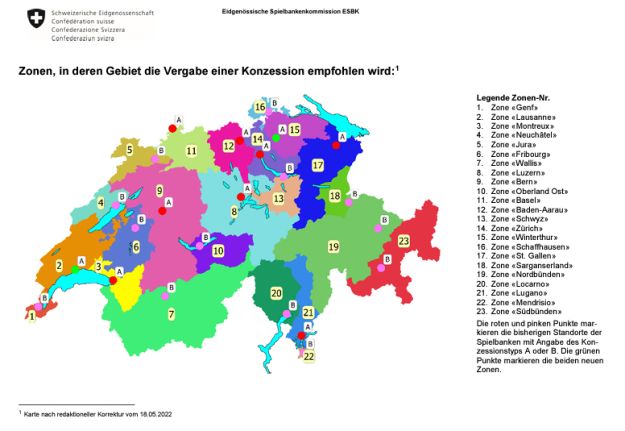
Source: Swiss Confederation, Swiss Federal Gaming Board
(SFGB);
In accordance with Article 10 of the Gaming Act, the Swiss Federal Gaming Board (SFGB; ESBK; CFMJ) was tasked with investigating and conducting the licensing procedure. The invitation to tender for the award of the gaming house licences opened on 1 June 2022 and closed on 31 October 2022.
At the end of the call for tenders, which was set for 31 October 2022, the SFGB received a total of 29 licence applications (14 for an A licence and 15 for a B licence) for the 23 licences that will be awarded. On 17 February 2023, in accordance with Article 10(2) of the Federal Gaming Act, the SFGB published the main points of the applications in the Federal Gazette and in the official gazette of the canton in which the gaming venue is located.
With one exception, all the current casino operators wish to continue operating in the same municipality in the same zone. The Swiss Casinos Group decided not to reapply for a licence for its current location in Schaffhausen and submitted an application for the new Winterthur zone. However, a group of private investors, MW Management & Event AG, wanted to take over the operation of the Schaffhausen casino and submitted a licence application to this effect.
In 19 zones (Baden-Aarau, Berne, Bernese Oberland East, Geneva, Fribourg, Jura, Lucerne, Lugano, Locarno, Mendrisio, Montreux, Neuchâtel, North Graubünden, South Graubünden, Sarganserland, Schaffhausen, Schwyz, Winterthur and Zurich), only one applicant per zone submitted a file for the licence to be awarded, and there was no competition or rivalry.
In 4 zones (Zone 2 "Lausanne"; Zone 7 "Valais"; Zone 11 "Basel"; Zone 17 "St. Gallen"), several applicants were competing for the same licence.
12 applicants simultaneously applied for an extension of their licence to operate online casino games. 10 of them already have an online offering.
How does Switzerland's Gambling Act dictate the granting of casino licenses?
Article 8 of the Gambling Act defines the conditions under which a licence may be granted. Applicants must meet criteria relating to organisation, finances, profitability, economic usefulness, social protection and security. Only limited companies incorporated under Swiss law with sufficient capital, a credible business plan and a programme of social measures to protect players may be considered for a licence.
As a first step, the SFGB checked whether the applications met the conditions set out in Article 8 of the Gambling Act. For applicants with no competitors in the area in question, this was the end of the substantive examination of their applications.
After the formal check carried out by the SFGB, 28 applications met the formal requirements. Only the application for the Schaffhausen zone was incomplete and did not comply with the criteria, so the criteria were not met for the SFGB to examine compliance with the conditions prescribed by law. Incomplete applications are not taken into account when awarding a licence. In accordance with the provisions of the Gaming Ordinance, the Federal Council has therefore decided not to consider the application for the Schaffhausen area. This decision closes the procedure and is not subject to appeal. As a result, no operating licence can be awarded for the Schaffhausen zone in autumn 2023. The Federal Council has mandated the SFGB to consider options on how to proceed with the question of awarding a licence in the Schaffhausen zone.
An applicant withdrew its application for zone 2 in Lausanne, as the city of Lausanne had declared itself opposed to the operation of a gambling establishment in Lausanne. Initially, three applicants were interested in the Lausanne zone: GCDL SA, which wanted to operate a gaming establishment in Lausanne; Projet Casino Prilly SA, which wanted to set up a gambling establishment in the municipality of Prilly; and Casino du Léman SA, which wanted to set up a casino in the municipality of Romanel-sur-Lausanne. This left only two candidates for zone 2.
In a second stage, the SFGB compared the licence applications for areas where several applicants were competing. Using evaluation criteria (see the report on the award of new licences for the operation of Swiss gaming venues from 1 January 2025, page 16), the SFGB looked for qualitative differences between the applications to determine which best met the requirements in relation to the competing applications and which location within the zone could best exploit the existing market potential.
In a third step, the results of the qualification and evaluation of the applications were converted into points and transferred to a scale. The evaluation scores were then weighted by area, with player protection and safety being given as much weight (50%) as economic and financial aspects.
In accordance with Article 10(4) of the Gambling Act, the SFGB submitted a proposal to the Federal Department of Justice and Police (FDJP) for consideration by the Federal Council. The FDJP forwarded the report and the proposal to the Federal Council.
How will the Federal Council's new concessions impact Switzerland's casino landscape from 2025?
The Federal Council issued on 29 November 2023 concessions for the period 2025 to 2044. Its decision is not subject to appeal.
Applicants who have received a licence from the Federal Council will be able to start operating on 1 January 2025 at the earliest. Before that date, they will have to demonstrate through a pre-opening inspection procedure that the legal requirements have been met and obtain authorisation from the SFGB for each of the games they wish to offer. For the 20 current gambling house operators who wish to continue their activity in the same establishment in the zone where they are located from 1 January 2025, this will mean in practice simply continuing their current activities.
Once operations have commenced, the SFGB will monitor the gambling houses' compliance with the provisions of the gambling legislation as part of its regular supervisory activities, and will take appropriate action if it finds any violations or abuses.
In short, Switzerland will receive two additional casinos in Winterthur and Lausanne. Initially, there will be no more casinos in the Schaffhausen area, as the application from the sole applicant has been rejected. As a result, the current casino will cease operations in Schaffhausen at the end of 2024. The licence could be put out to tender again in the first quarter of 2026. The Federal Council will decide how to proceed with the concession for the Schaffhausen area once a new report on the casino landscape has been drawn up in 2028.
In the vast majority of zones, only the current licence holders applied for a new licence. All of them met the conditions laid down in the legislation, so the Federal Council followed the SFGB's recommendations and granted a new licence to these applicants. In concrete terms, the current operators will be able to continue operating beyond 2024 in the zones of Baden-Aarau, Bern, Bernese Oberland East, Geneva, Fribourg, Jura, Lucerne, Lugano, Locarno, Mendrisio, Montreux, Neuchâtel, North Graubünden, South Graubünden, Sarganserland, Schwyz and Zurich. Only one applicant was interested in the newly created Winterthur zone. The Federal Council has therefore approved the application from Swiss Casinos Winterthur AG.
For the Basel, St. Gallen and Valais areas, the current licence holders have won:
- The attempt to obtain a licence for a new casino in Oftringen (canton of Aargau) failed. The aim was to fill a 'gap' along the A1 Highway between the casino in Baden (also in the canton of Aargau) and the casino in Bern. As Oftringen is part of the Basel region in the Confederation's regional distribution of casinos, the Basel casino would have had to disappear if Oftringen had obtained the licence. The Federal Gaming Board took the view that Airport Casino Basel AG's location in a densely populated border region enables it to exploit the commercial potential of the region and neighbouring countries much more effectively than the other applicant Swiss Casino Oftringen AG. This favourable location generates higher gross gaming revenue (GGR) and higher OASI tax receipts. Airport Casino Basel AG's application received an overall better assessment than that of Swiss Casino Oftringen AG in all areas.
- In addition, in the new Lausanne area, the Federal Council awarded the concession to Projet Casino Prilly SA, which received a better overall assessment in all areas (in particular, better coverage of liquidity risk and equity cover; a particularly convincing analysis of the competition; clear marketing plans and a detailed description of the preparatory phase up to the opening of the gaming house) than Casino du Léman (Projet) SA, which was defended in Romanel-sur-Lausanne. It should be noted that the two applications were judged to be more or less equivalent in the areas of "Social measures programs" and "Correct taxation of the tax on gambling houses".
- In the Valais area, the Crans-Montana gambling house will remain in place, and there will be no casino in Sion or Martigny. The winner is the Société du Casino de Crans-Montana SA, which received the most favourable evaluation. Second place went to Casino du Valais SA (Sion), well ahead of Casino des Alpes SA (Martigny).
The four applicants (Société du Casino de Crans-Montana SA, Société Fribourgeoise d'Animation Touristique SA, Casino du Lac Meyrin SA and Casinò Admiral SA (for the Mendrisio location)) who applied for tax relief on the grounds of investments in projects of general interest or public utility fulfil the conditions set out in art. 121, para. 1 of the Gambling Act. Of the three applicants for tax relief on the grounds of dependence on a highly seasonal tourism business, only two (Casino Davos AG and Casino St. Moritz AG) meet the conditions set out in Art. 121 para. 2 of the Gambling Act, which is not the case for Casino de Crans-Montana SA. The SFGB therefore recommended that the Federal Council approve six of the seven applications for tax relief and reject one.
Finally, the range of online casino games is set to expand even further. The Federal Council has granted 12 applicants an extension to their licences, enabling them to offer games on the Internet. 2 applicants, Casinò Locarno SA and Casino St. Moritz AG, will receive an online licence for the first time. The other 10 applicants already had such a licence extension.
Image 4: Map of the new landscape from 2025
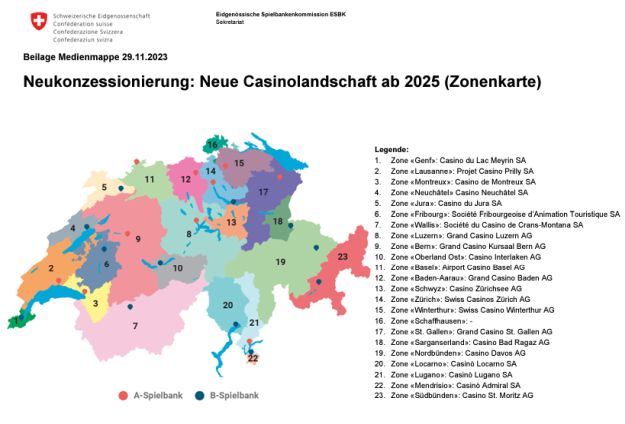
Source: Swiss Confederation, Swiss Federal Gaming Board
(SFGB)
How can we help?
We support you in the regulatory and legal aspects of the operation of your industry and of your projects. Lionel Patrick Serex, Attorney-at-law, LL.M., Executive MBA, directed recently the legal and compliance department of a Swiss group of gambling houses. In 2022, he contributed to the applications filed by this casino group for the granting of new concessions from 2025.
Originally published 6 Dec 2023
The content of this article is intended to provide a general guide to the subject matter. Specialist advice should be sought about your specific circumstances.

